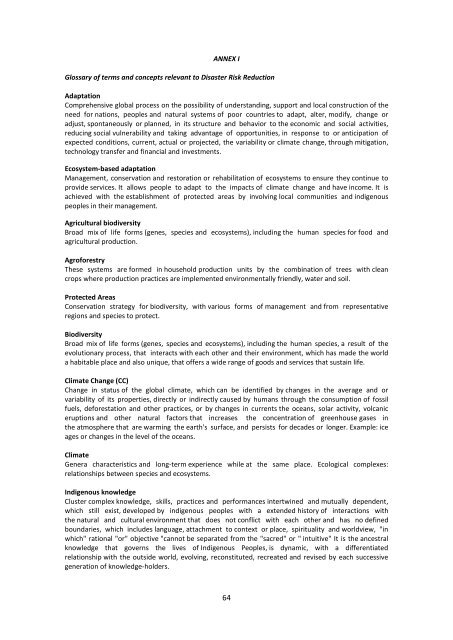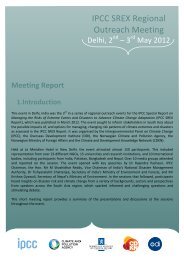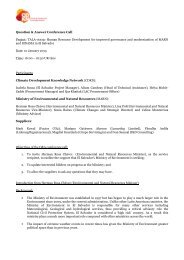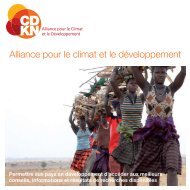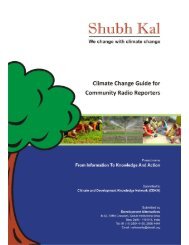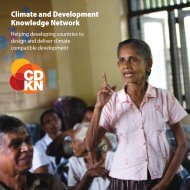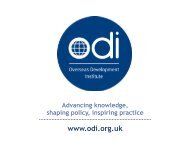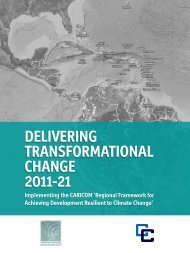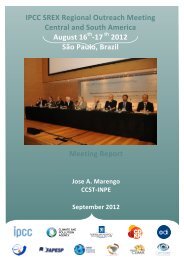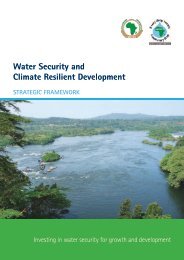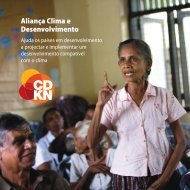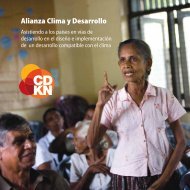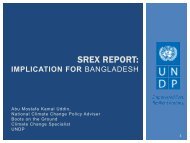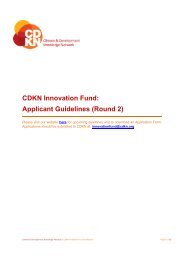ANNEX IGlossary of terms and concepts relevant to Disaster Risk ReductionAdaptationComprehensive global process on the possibility of understanding, support and local construction of theneed for nations, peoples and natural systems of poor countries to adapt, alter, modify, change oradjust, spontaneously or planned, in its structure and behavior to the economic and social activities,reducing social vulnerability and taking advantage of opportunities, in response to or anticipation ofexpected conditions, current, actual or projected, the variability or climate change, through mitigation,technology transfer and financial and investments.Ecosystem-based adaptationManagement, conservation and restoration or rehabilitation of ecosystems to ensure they continue toprovide services. It allows people to adapt to the impacts of climate change and have income. It isachieved with the establishment of protected areas by involving local communities and indigenouspeoples in their management.Agricultural biodiversityBroad mix of life forms (genes, species and ecosystems), including the human species for food andagricultural production.AgroforestryThese systems are formed in household production units by the combination of trees with cleancrops where production practices are implemented environmentally friendly, water and soil.Protected AreasConservation strategy for biodiversity, with various forms of management and from representativeregions and species to protect.BiodiversityBroad mix of life forms (genes, species and ecosystems), including the human species, a result of theevolutionary process, that interacts with each other and their environment, which has made the worlda habitable place and also unique, that offers a wide range of goods and services that sustain life.Climate Change (CC)Change in status of the global climate, which can be identified by changes in the average and orvariability of its properties, directly or indirectly caused by humans through the consumption of fossilfuels, deforestation and other practices, or by changes in currents the oceans, solar activity, volcaniceruptions and other natural factors that increases the concentration of greenhouse gases inthe atmosphere that are warming the earth's surface, and persists for decades or longer. Example: iceages or changes in the level of the oceans.ClimateGenera characteristics and long-term experience while at the same place. Ecological complexes:relationships between species and ecosystems.Indigenous knowledgeCluster complex knowledge, skills, practices and performances intertwined and mutually dependent,which still exist, developed by indigenous peoples with a extended history of interactions withthe natural and cultural environment that does not conflict with each other and has no definedboundaries, which includes language, attachment to context or place, spirituality and worldview, "inwhich" rational "or" objective "cannot be separated from the "sacred" or " intuitive" It is the ancestralknowledge that governs the lives of Indigenous Peoples, is dynamic, with a differentiatedrelationship with the outside world, evolving, reconstituted, recreated and revised by each successivegeneration of knowledge-holders.64
Local knowledgeIncludes people and communities that live in rural or urban areas. It is knowledge that is acquired bypractice and experience; they know it to be helpful. It covers all the perceptions, beliefs, understandingsand skills that one or more members of a community or potential uses to communicate and manipulatethe world, formed by the natural physical environment and built, as well as the social, economic andpolitical consequences on the environment that affect the production and consumption locally, withdynamic features and steadily increased production in the tendency to hybridization.Traditional Knowledge:Knowledge that is managed by expert and local communities, which develops, conducted and is ownedcollectively and individually, and is transmitted through print, oral and nonverbal Medias between andwithin cultures, generations, populations, communities, households and individuals.World ViewThoughts centered on nature. Harmonious and holistic relationship of the elements of mother earth andthe universe. The human being is one of the beings of mother earth. Practice and lifestyle of itsinhabitants to live with respect, understanding, communication, interaction and networking withMother Earth and the Universe. Human beings belong to Mother Earth and the universe.It is the practice and lifestyle of Indigenous Peoples. It is a way of seeing, feeling, understanding andliving life to its fullest, in interaction and interconnection with Mother Earth and the Universe. Thesepractices are reflected in the literature, ideograms, art, knitting and music, especially reflected in thedialogue that takes place in ceremonial events of appreciation for the existence of humans and all livingthings that coexist in the mother Earth. At this time there is dialogue and communication with the entireUniverse.EcosystemsDynamic complex of plants, animals and micro-organisms communities and their non-livingenvironment, interacting as a functional unit.Climate scenarioCoherent description, internally consistent and plausible of a possible future climate condition.Hydro meteorological phenomena.MitigationReduction of greenhouse gases emissions legally binding on developed countries. For developingcountries is to determine the appropriate level of mitigation and the registration process to establishand support national actions.Disaster Risk Reduction (DRR)Multidimensional conceptual theoretical framework, which involves all political, technical, social oreconomic actions, from governments to individuals, aimed at disaster risk reduction, loss of life, socialequity, economic and environmental losses.Social, economic, structural and environmental resilienceImplementation of appropriate technology, and strengthening participation, improve interventionsand use of biodiversity and ecosystems, increase responsiveness, strengthen and improve their skillsand livelihoods. Collection, compilation, dissemination and use of local knowledge and of indigenouspeoples. All this requires good information and motivation.Climate VariabilityFluctuations occur year after year and also the statistics of extreme conditions, such as severestorms or unusually hot seasons. Phenomena that change slowly can last for whole seasons or evenyears as ENSO.65
- Page 3 and 4:
Executive SummaryCentral America is
- Page 5 and 6:
Central is located in the "Ring of
- Page 7 and 8:
Study ContentAs an innovative theme
- Page 9 and 10:
that coexist in the universe. This
- Page 11 and 12:
Central America level, is the only
- Page 13 and 14: of Mesoamerica has been explained a
- Page 15 and 16: possesses effective cultural commun
- Page 17 and 18: Additionally, to succeed and achiev
- Page 19 and 20: eforestation, hydrological planning
- Page 21 and 22: General thematic introduction on Cl
- Page 23 and 24: Central American Governments should
- Page 25 and 26: projected 109 conditions, changes o
- Page 27 and 28: General introduction on the themati
- Page 29 and 30: participatory manner, to address di
- Page 31 and 32: Causes and complementary consequenc
- Page 33 and 34: Organizational and legal contextWhi
- Page 35 and 36: The three bodies within the SICA ar
- Page 37 and 38: Based on research of available info
- Page 39 and 40: SE-CONREDCivilProtectionSNETCCNISCO
- Page 41 and 42: Synergy model that displays the add
- Page 43 and 44: Added value of indigenous and local
- Page 45 and 46: They do not work in a separate mann
- Page 47 and 48: demand for agricultural raw materia
- Page 49 and 50: Amazon DIPECHO Project “Strengthe
- Page 51 and 52: Indigenous Knowledge on DisasterMit
- Page 53 and 54: The combination of indigenous andsc
- Page 55 and 56: Indigenous Skills and the mysticism
- Page 57 and 58: Weather forecast through indigenous
- Page 59 and 60: In various international convention
- Page 61 and 62: Recommended ReadingBennett, A., 200
- Page 63: ILO, 1993, Convenio sobre pueblos i
- Page 67 and 68: which are threatswith a certainprob
- Page 69 and 70: Appreciates and respects their orga
- Page 71 and 72: framework, without taking into acco
- Page 73 and 74: Currently Cacaopera ethnicity, alth
- Page 75 and 76: IDH 228 For 2007 is of 0.6999Politi
- Page 77 and 78: The Mayangnas are people who are de
- Page 79 and 80: Rights of detainees to receive info
- Page 81 and 82: Heritage Protection Article 128The
- Page 83 and 84: 19/09/1996 Law no. 230 Amendments a
- Page 85 and 86: Indigenous Population:IDH 241 In 20
- Page 87 and 88: Honduras, each has a different orig
- Page 89 and 90: MISQUITOS 248 :In 1996 there were 3
- Page 91: Internationalconventions signed wit


